Key takeaways:
- Understanding child safeguarding laws is essential for protecting children’s rights and well-being, requiring familiarity with local and national regulations.
- Business licenses validate organizational commitment to safety and open opportunities for funding and partnerships, promoting accountability.
- Navigating the licensing process involves understanding requirements, gathering documentation, and being prepared for potential costs and delays.
- Maintaining compliance requires detailed tracking systems, regular policy reviews, and fostering open communication among team members.
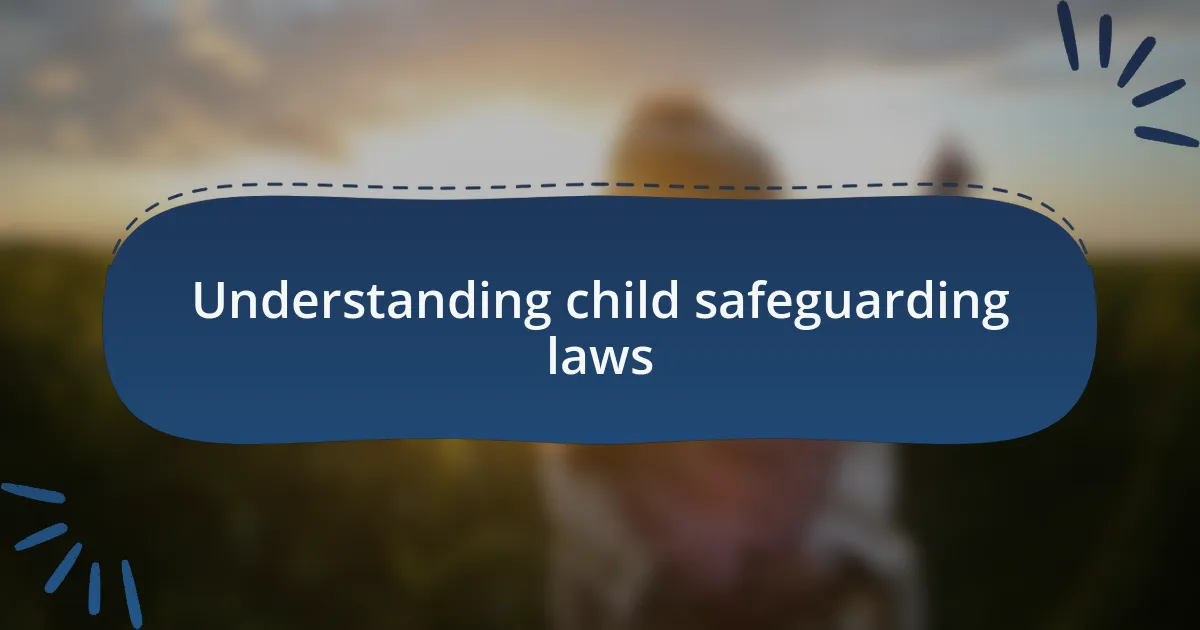
Understanding child safeguarding laws
Understanding child safeguarding laws is crucial for anyone working with children, as these laws are designed to protect their well-being and rights. I recall the first time I navigated these regulations; it felt overwhelming, but I quickly realized how essential they are. Can you imagine a world where children are left unprotected?
These laws vary considerably across regions, which can add to the complexity. When I was establishing a program, I had to familiarize myself with both local and national statutes, attending workshops and reaching out to experts. It struck me how each regulation is not just a bureaucratic hurdle but a crucial step towards ensuring a safer environment for children.
One aspect that often gets overlooked is the emotional weight of child safeguarding laws. They aren’t merely rules; they represent a commitment to protect vulnerable individuals. I remember a poignant moment when a colleague shared how her understanding of these laws changed her approach to her work. It made me question: how often do we reflect on the impact these laws have not just on our practices, but on the lives of the children they aim to protect?
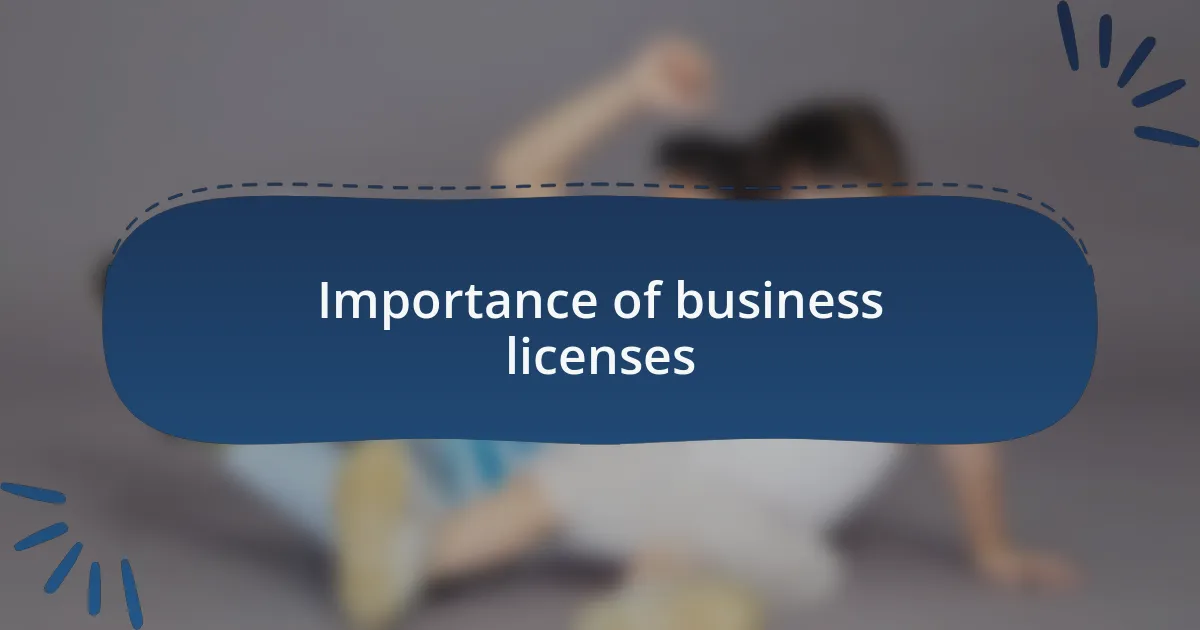
Importance of business licenses
Business licenses hold significant importance for any organization, especially in the realm of child safeguarding. I vividly recall the relief I felt when I finally secured our licensing; it validated our commitment to operate within legal frameworks. It made me think about the trust parents place in us, believing we meet required standards to keep their children safe.
Beyond regulatory compliance, having a business license opens doors to funding opportunities and partnerships. I once attended a grant proposal workshop where the instructor emphasized that funders often prefer licensed organizations because they demonstrate accountability. This insight pushed me to realize how much more credible we appeared to the community and potential supporters once our license was in place.
Additionally, maintaining a business license promotes a culture of accountability and professionalism in our work. I often reflect on how navigating the application process itself prompted us to assess our internal policies and child safeguarding measures. It’s fascinating how a piece of paper can inspire such profound change and engagement in a team focused on protecting children. How often do we realize that regulatory elements can drive us toward higher standards of care?
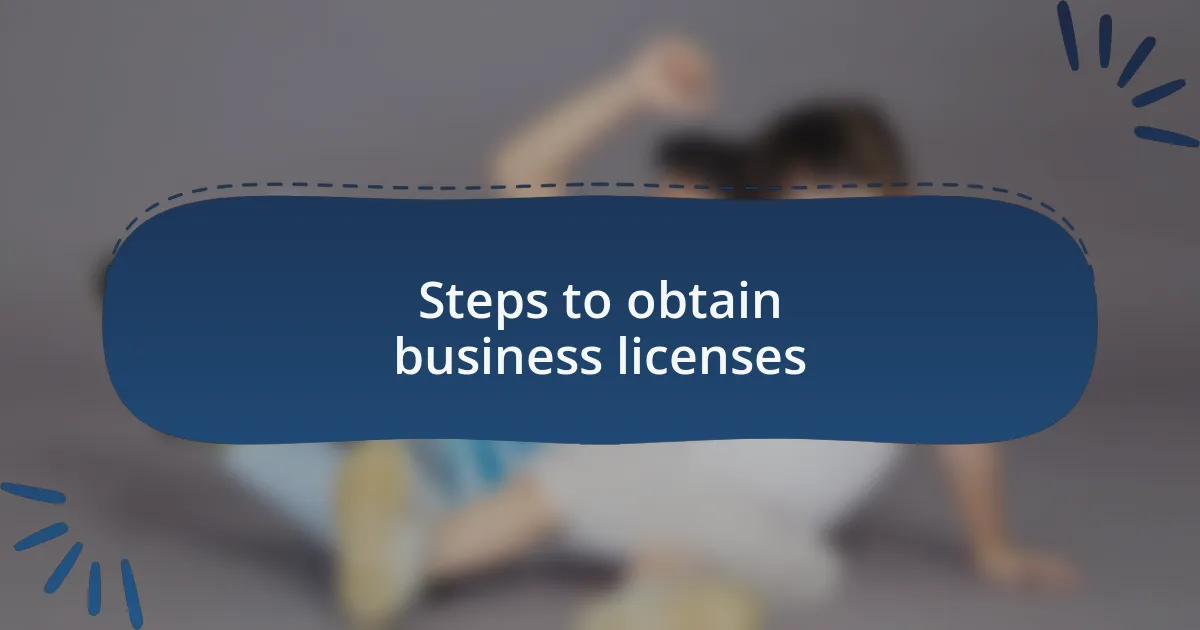
Steps to obtain business licenses
When seeking a business license, the first crucial step is to understand the specific requirements in your state or locality. I remember sifting through a mountain of paperwork and regulations, feeling a bit overwhelmed at first. However, breaking down the steps into manageable tasks made a significant difference in my clarity and focus.
Next, you’ll need to gather necessary documentation, which often includes things like proof of identity, your business plan, and even background checks. I still recall the late nights I spent compiling these documents, driven by the knowledge that each piece brought me closer to legitimizing our efforts in child safeguarding. Have you ever felt that thrill when everything starts to come together?
Finally, once your application is completed, it’s time to submit it and pay any associated fees. The waiting game can be nerve-wracking; I vividly remember the anxiety of waiting for approval while pondering what it would mean for our organization. Getting that license in the mail was not just a formality; it was a validation of the hard work and dedication my team put into creating a safe environment for children.
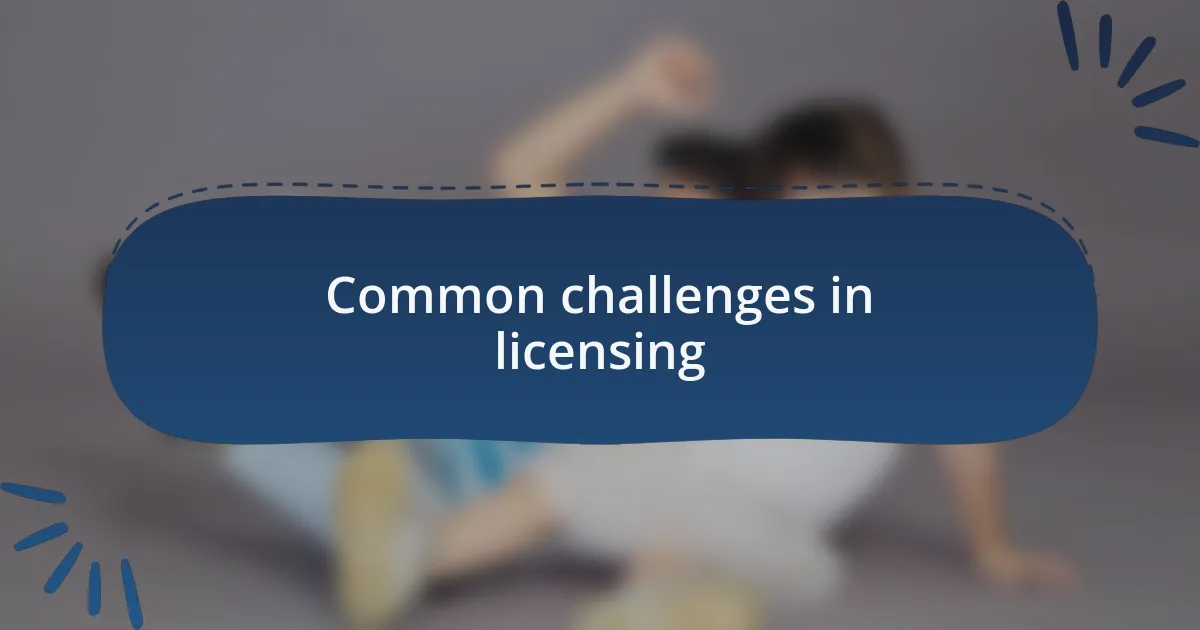
Common challenges in licensing
Navigating the business licensing landscape can feel like traversing a maze, especially when regulations are inconsistent or unclear. I recall a specific instance where the requirements seemed to change overnight, forcing me to double-check my application process. Have you ever struggled with conflicting information? It’s incredibly frustrating and can delay your plans substantially.
Another significant hurdle I encountered was the time it takes for approvals, which often left me feeling like I was in limbo. There were moments when I wondered if all the effort would be worth the wait. It took several months to receive our license, and during that time, I learned the importance of persistence and patience—qualities that are vital in any endeavor, especially one focused on safeguarding children.
Lastly, I found that costs associated with acquiring licenses can be a surprise factor. I remember budgeting meticulously, only to find that the fees were higher than I had anticipated. How do you handle unexpected expenses? Understanding that these costs were a necessary investment in our mission helped me navigate that challenge with a clearer mind, reinforcing my commitment to providing a safer environment for children.
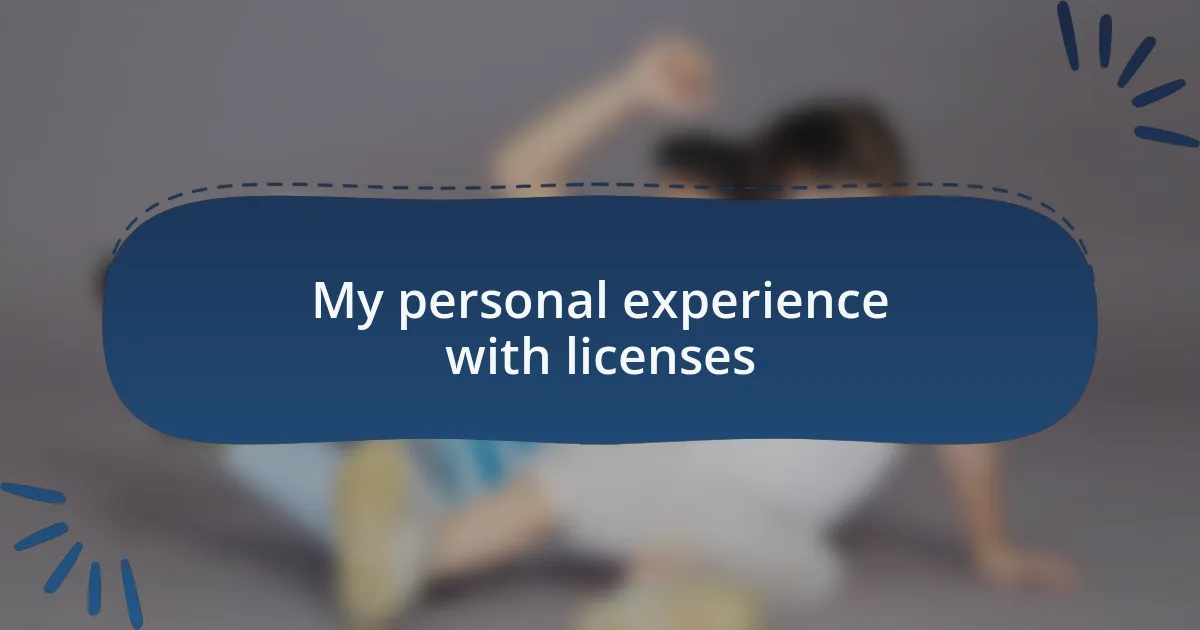
My personal experience with licenses
I distinctly remember the first time I applied for a business license. The paperwork felt overwhelming, and I couldn’t shake off the anxiety that accompanied each form I submitted. Did I meet all the requirements? Fortunately, I leaned on the guidance of a mentor, which transformed my anxiety into confidence.
Another memorable experience was the moment I received my first license approval. I still recall the sheer relief I felt, akin to lifting a heavy weight off my shoulders. It was affirmation that all the late nights and countless hours were worth it. Have you ever experienced that rush of accomplishment? It truly emphasizes the importance of perseverance in the face of daunting challenges.
Looking back, I realize that each setback brought invaluable lessons. I learned to approach licensing not just as a task, but as an essential component of my commitment to child safeguarding. Each renewed license serves as a reminder of our shared responsibility. How do you view the licensing process? For me, it’s a vital stepping stone in creating a safe environment for children, something that I deeply care about.
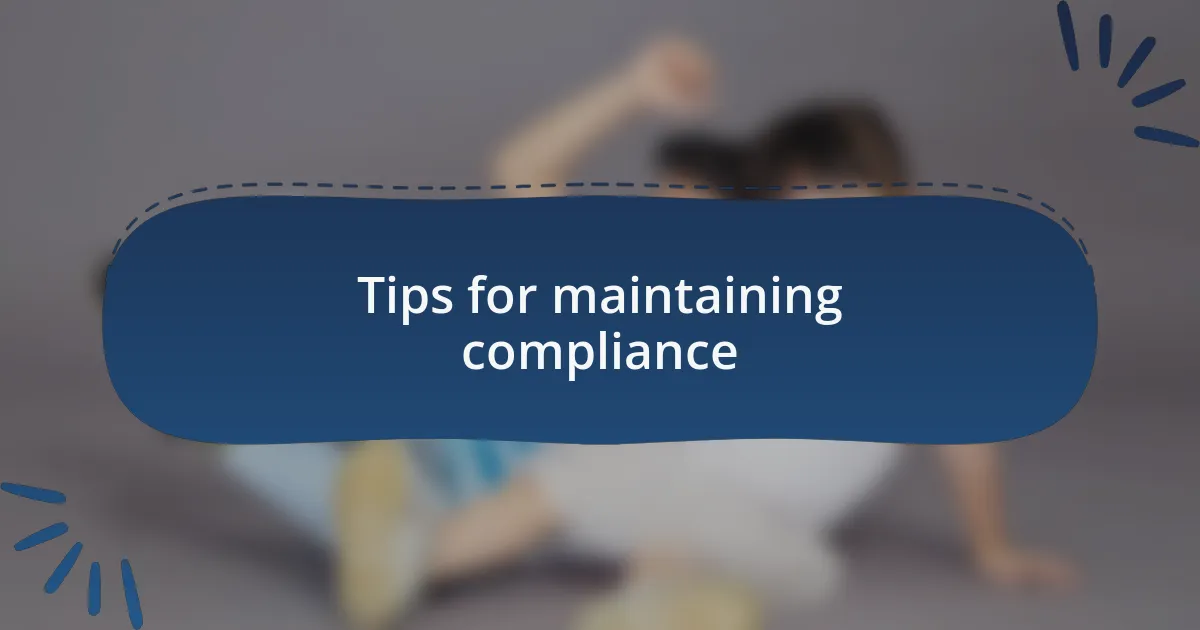
Tips for maintaining compliance
One of the most effective ways to maintain compliance with business licenses is to create a detailed tracking system for renewal dates and requirements. I remember a time when I nearly missed a crucial renewal deadline because I lost track of the date. Implementing a calendar reminder not only saved me from stress but also instilled a sense of discipline in my approach to compliance. Have you ever experienced that panic of rushing to meet a deadline?
Regularly reviewing your policies and procedures is also essential. I set aside time each quarter to revisit our compliance checklist, ensuring that nothing falls through the cracks. One instance where this practice paid off was when I discovered outdated training processes that were no longer aligned with current regulations. This proactive approach reinforced my belief that staying informed is crucial, especially when the stakes involve children’s safety and well-being.
Lastly, fostering open communication with your team can significantly enhance compliance efforts. I encouraged my staff to share insights and raise concerns about our practices during team meetings. This collaborative atmosphere not only empowered them but also led to the identification of potential compliance issues before they escalated. Have you considered how a team-oriented approach could strengthen your own compliance efforts?
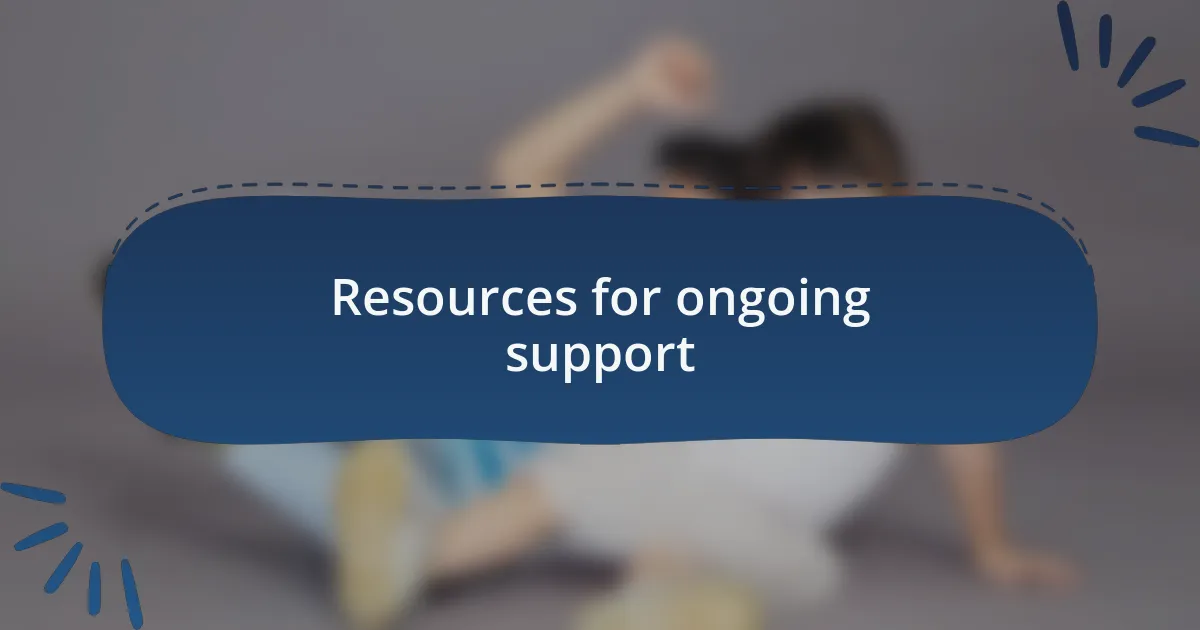
Resources for ongoing support
Maintaining ongoing support for your business licensing needs is vital, especially in the field of child safeguarding. One resource I found incredibly helpful was joining professional networks. During a particularly challenging period, I reached out to fellow business owners through a local network, and their shared experiences and advice provided me with fresh perspectives and solutions that I hadn’t considered before. Have you tapped into your local community for support?
Another invaluable resource is online training and webinars that focus on compliance best practices. I once participated in a webinar that highlighted relevant changes in regulations, and the insights gained were eye-opening. These sessions not only deepen my understanding but also keep me connected with trends impacting our field. What was the last training you attended that sparked new ideas?
Don’t overlook the role of social media platforms dedicated to business compliance discussions. I often find myself scrolling through these groups, where professionals exchange tips and resources. Just last week, a member provided a valuable checklist for keeping up with licensing requirements that I immediately incorporated into my routine. How often do you engage with these digital communities to enhance your compliance knowledge?